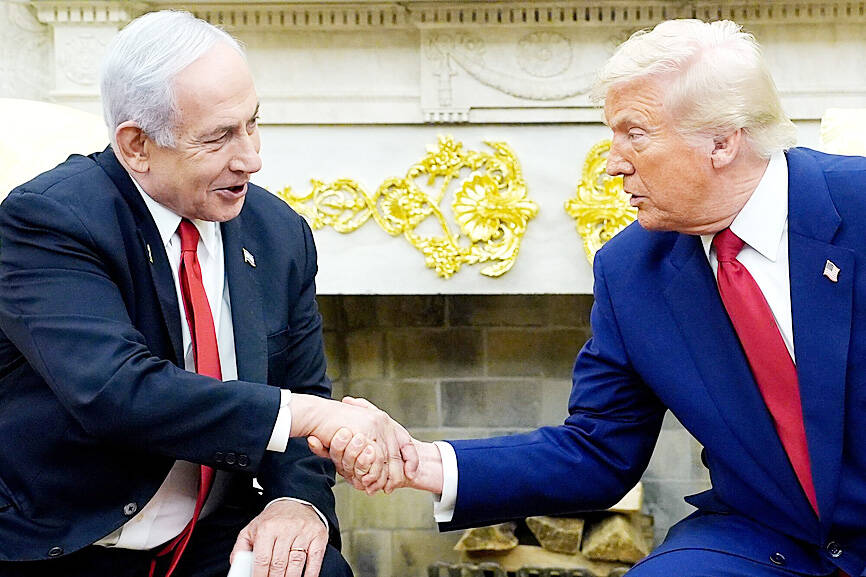US President Donald Trump on Monday made a surprise announcement that the US and Iran are poised to begin direct talks on Tehran’s nuclear program, but the Iranian minister of foreign affairs said the discussions in Oman would be indirect.
In a further sign of the difficult path to any deal between the two geopolitical foes, Trump issued a stark warning that if the talks were unsuccessful, “Iran is going to be in great danger.”
Iran had pushed back against Trump’s demands that it directly negotiate over its nuclear program or be bombed, and it appeared to be sticking to that position on Monday.

Photo: Bloomberg
“We’re having direct talks with Iran, and they’ve started. It’ll go on Saturday. We have a very big meeting and we’ll see what can happen,” Trump told reporters in the Oval Office during a meeting with Israeli Prime Minister Benjamin Netanyahu.
“And I think everybody agrees that doing a deal would be preferable,” Trump said.
He added that Saturday’s talks with Iran would be at a very high level, without elaborating.
He declined to say where the talks would take place, but held out the possibility that a deal could be reached.
Iranian Minister of Foreign Affairs Abbas Araqchi said on social media that indirect high-level talks would be held in Oman, adding: “It is as much an opportunity as it is a test. The ball is in America’s court.”
Iranian state media yesterday said the talks would be led by Araqchi and US presidential envoy Steve Witkoff, with the intermediation of Omani Minister of Foreign Affairs Badr al-Busaidi.
The US and Iran held indirect talks during former US president Joe Biden’s term, but they made little if any progress. The last known direct negotiations between the two governments were under then-US president Barack Obama, who spearheaded the 2015 international nuclear deal that Trump later abandoned.
Warnings by Trump of military action against Iran had jangled already tense nerves across the Middle East after open warfare in Gaza and Lebanon, military strikes on Yemen, a change of leadership in Syria and Israeli-Iranian exchanges of fire.
Trump, who has beefed up the US military presence in the region since taking office in January, has said he would prefer a deal over Iran’s nuclear program to armed confrontation and on March 7 said that he had written to Iranian supreme leader Ayatollah Ali Khamenei to suggest talks.
Iranian officials said at the time that Tehran would not be bullied into negotiations.
“Iran cannot have a nuclear weapon, and if the talks aren’t successful I actually think it will be a very bad day for Iran,” Trump said in the Oval Office on Monday.
Direct talks would not occur without the explicit approval of Ali Khamenei, who in February said negotiations with the US were “not smart, wise or honorable.”
Hours before Trump’s announcement, Iranian Ministry of Foreign Affairs spokesman Esmail Baghaei said Iran was awaiting a US response to Tehran’s proposal for indirect negotiations. He said the Islamic Republic believed it was making a generous, responsible and honorable offer.
After Trump spoke, a senior Iranian official, speaking on condition of anonymity, said: “The talks will not be direct... It will be with Oman’s mediation.”

FALSE DOCUMENTS? Actor William Liao said he was ‘voluntarily cooperating’ with police after a suspect was accused of helping to produce false medical certificates Police yesterday questioned at least six entertainers amid allegations of evasion of compulsory military service, with Lee Chuan (李銓), a member of boy band Choc7 (超克7), and actor Daniel Chen (陳大天) among those summoned. The New Taipei City District Prosecutors’ Office in January launched an investigation into a group that was allegedly helping men dodge compulsory military service using falsified medical documents. Actor Darren Wang (王大陸) has been accused of being one of the group’s clients. As the investigation expanded, investigators at New Taipei City’s Yonghe Precinct said that other entertainers commissioned the group to obtain false documents. The main suspect, a man surnamed

The government is considering polices to increase rental subsidies for people living in social housing who get married and have children, Premier Cho Jung-tai (卓榮泰) said yesterday. During an interview with the Plain Law Movement (法律白話文) podcast, Cho said that housing prices cannot be brought down overnight without affecting banks and mortgages. Therefore, the government is focusing on providing more aid for young people by taking 3 to 5 percent of urban renewal projects and zone expropriations and using that land for social housing, he said. Single people living in social housing who get married and become parents could obtain 50 percent more

DEMOGRAPHICS: Robotics is the most promising answer to looming labor woes, the long-term care system and national contingency response, an official said Taiwan is to launch a five-year plan to boost the robotics industry in a bid to address labor shortages stemming from a declining and aging population, the Executive Yuan said yesterday. The government approved the initiative, dubbed the Smart Robotics Industry Promotion Plan, via executive order, senior officials told a post-Cabinet meeting news conference in Taipei. Taiwan’s population decline would strain the economy and the nation’s ability to care for vulnerable and elderly people, said Peter Hong (洪樂文), who heads the National Science and Technology Council’s (NSTC) Department of Engineering and Technologies. Projections show that the proportion of Taiwanese 65 or older would

Democracies must remain united in the face of a shifting geopolitical landscape, former president Tsai Ing-wen (蔡英文) told the Copenhagen Democracy Summit on Tuesday, while emphasizing the importance of Taiwan’s security to the world. “Taiwan’s security is essential to regional stability and to defending democratic values amid mounting authoritarianism,” Tsai said at the annual forum in the Danish capital. Noting a “new geopolitical landscape” in which global trade and security face “uncertainty and unpredictability,” Tsai said that democracies must remain united and be more committed to building up resilience together in the face of challenges. Resilience “allows us to absorb shocks, adapt under